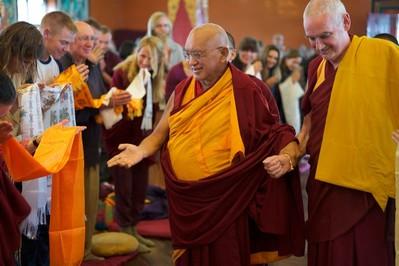In one day there are so many ups and downs, so much sadness because of what people say about us, how people behave toward us, whether they respect us or not. All this is because our attachment needs this. Then, our life is filled with problems; problems made by our own mind. Nobody else makes them, just our own concepts.
There is no need to hold on to that attachment, no need to create problems, no need to experience problems. They happen because we do not know and practice meditation; we do not know and practice the Dharma in our daily life. Living in meditation, in the Dharma, in daily life keeps our mind free from this painful attachment, this grasping. But not knowing and practicing this, we feel unhappy and sad, and we get angry, jealous and all these things. Although we don’t need to create and experience problems, we do, because we lack Dharma knowledge, we lack knowing how to meditate, how to practice, how to look after ourselves.
Practicing Dharma, practicing meditation, in our daily life is the best psychology. If we are living in meditation, in Dharma, in the lamrim, that is the best thought transformation. We might be trying to offer psychology to others, but if we ourselves are not living in psychology, if we are not looking after ourselves, protecting ourselves, then we are not loving ourselves. We can use the words, “I don’t love myself” here.
In our daily life, if we live in the Dharma, in the meditation practice, in the best psychology, we are protected from the tsunami of attachment, the tsunami of anger because these delusions cannot come and take over our mind, take over our life. We control the tsunami of attachment and anger, and all the delusions, all the violent thoughts. We are able to protect ourselves from them. That way, we always have security, we always have stability, we always have happiness and peace inside. There is no depression.
One thing is, when we live in meditation, in the Dharma, there is no depression. Not following attachment, because we are free from it, our mind is healthy, peaceful, free. We are not imprisoned by attachment. We are not a prisoner, chained by attachment like the police chain a prisoner’s hands. When we don’t practice Dharma, when we don’t practice meditation in daily life, it is like we are totally living in a prison of attachment, in the eight worldly dharmas, the attachment grasping this life’s pleasure. There is no space to think of others, no space for compassion, no space for bodhicitta. There is only total attachment to our own happiness, to the happiness of this life, not to that of future lives and not to liberation for ourselves, but just for this life. So, we are totally imprisoned, with no space to help others who are suffering; the mind is totally occupied by attachment.
In the West there is so much talk about how we should love ourselves. Here, the definition of loving ourselves, the way to love ourselves, to take care of ourselves, is to live our daily life in meditation, in the Dharma, rather than surrendering ourselves to attachment, becoming its slave, being totally used by it like garbage, like toilet paper. Whatever attachment wants, we totally become its slave.
Instead of that, by the mind living in the Dharma, in meditation, we are free, independent. Independent of that most dangerous enemy, we are happy and peaceful. Then, we are able to engage in many virtuous activities. On that basis, it is much easier to develop compassion for others, to help others. Engaging in virtuous activities is the cause of happiness, not only temporary happiness but liberation and enlightenment.
The other way, as I mentioned before, by constantly following desire, worldly concern, without meditation, without the Dharma, we constantly engage in many negative karmas with our body, speech and mind. We harm ourselves and others so much by doing the ten nonvirtuous actions. Like the examples I gave and so many others, we harm ourselves and others directly or indirectly, and then we constantly experience problems, one after another. Our life is filled with problems. And life goes on like that. It is very, very sad.
Conversely, when there is no attachment to receiving praise from somebody, when there is no clinging to that, there is no dislike or unhappiness when that does not happen. Being praised or not, even being criticized, does not bother us. Whatever happens, there is stability, which means there is so much peace and happiness in our life; we are independent.
When there is attachment to receiving material things, such as birthday presents or birthday cakes, when we don’t receive them, it becomes a big problem! It becomes a huge issue! The person gave us these things on our last birthday but this time they didn’t! Not receiving material things becomes a huge disturbance, causing dislike and unhappiness.
When there is no attachment to receiving material things, when that does not happen, there is no dislike and no unhappiness. These two are equalized. Whatever happens doesn’t bother us. There is always stability and peace in life.





























